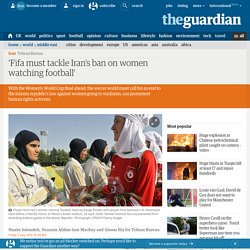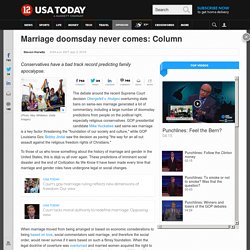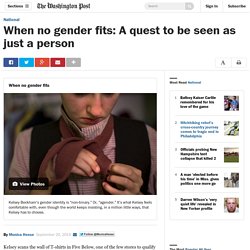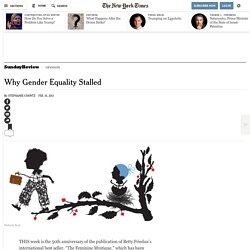

'Fifa must tackle Iran's ban on women watching football' As the world watches Sunday’s Women’s World Cup final, TV cameras will capture the joyful faces of spectators of all ages, races, and genders.

Such joy, taken for granted by many people around the world, is unfortunately denied to women in Iran. Since 1982, the Islamic republic has prohibited women from attending football and other sporting events. Though such discrimination is a blatant violation of the statutes and guiding principles of Fifa, it has counted the Islamic republic of Iran football federation as a member for over 30 years without the slightest reproach. The time has come for the world to call on Fifa, and for Fifa to call on Iran, to put an end to discrimination against women. Iranian women – and men – have taken great risks to draw attention to gender apartheid at sporting events. In recent months, the movement has taken on a global dimension. In tackling gender discrimination, Fifa can take example from its strong position against racism.
Northumbria police chief Sue Sim makes sexism claim. The former chief constable of Northumbria Police has claimed senior male officers in the force treated her differently because she was a woman.

Speaking to BBC Radio 5 live, Sue Sim said she feared how other women might be being treated in the force. The claim appeared in an official report which cleared Ms Sim, who retired in June, of misconduct. Northumbria Police said it was disappointed and does not accept the accusation. Ms Sim said the formal report into complaints about the way she spoke to officers revealed she was treated differently by some senior officers because she was a woman. She described elements of policing as "rather old fashioned" and said some senior officers expected to maintain posts until they retired, regardless of their performance. Ms Sim told 5 live Daily: "I was absolutely shocked that my senior male colleagues treated me differently than they would have done a male chief constable.
Marriage doomsday never comes: Column. The debate around the recent Supreme Court decision Obergefell v.

Hodges overturning state bans on same-sex marriage generated a lot of commentary, including a large number of doomsday predictions from people on the political right, especially religious conservatives. GOP presidential candidate Mike Huckabee said same-sex marriage is a key factor threatening the "foundation of our society and culture," while GOP Louisiana Gov.
Bobby Jindal saw the decision as paving "the way for an all out assault against the religious freedom rights of Christians. " To those of us who know something about the history of marriage and gender in the United States, this is déjà vu all over again. These predictions of imminent social disaster and the end of Civilization As We Know It have been made every time that marriage and gender roles have undergone legal or social changes. In Loving v. Yet the institution of marriage is far more resilient than conservatives give it credit. Steven Horwitz is Charles A. With family finances, it's still battle of the sexes. Wealth coach Barbara Stanny tells her clients, "Talking about money is the ultimate form of intimacy.

" If so, some American couples are in a dry spell, according to one new study. Men and women view their roles in the family's finances differently, according to a study commissioned by TD Bank released this week. In particular, men and women still tend to fall in typical gender roles — with women taking a back seat for big financial decisions. The study polled 1,339 Americans in romantic relationships (involved, engaged or married) across multiple age groups, races and sexual orientations. When no gender fits: A quest to be seen as just a person. Kelsey scans the wall of T-shirts in Five Below, one of the few stores to qualify as “quirky” in this conservative part of western Michigan.

“Let’s Have a Party,” a shirt reads, near displays of body glitter and $5 leggings. “Warning: Prone to Shenanigans,” reads another, and after less than a minute, it’s clear the store doesn’t have what Kelsey is looking for, because no place ever does, at least not around here. “I think I might have to make you a gay shirt,” Kelsey’s friend Kahri offers as they walk out of the store. “Or not a gay shirt, but — you know.” “Yeah.” What Kelsey Beckham really wants is a shirt that communicates something very specific about its wearer. Kelsey’s gender identity is “non-binary.” Which box do you check when you don’t belong in any box? A few months earlier, someone started a petition on the White House Web site asking the government to recognize non-binary genders, and Kelsey signed it, petitioner number 22,711 out of an eventual 103,000.
Why Gender Equality Stalled. Photo THIS week is the 50th anniversary of the publication of Betty Friedan’s international best seller, “The Feminine Mystique,” which has been widely credited with igniting the women’s movement of the 1960s.

Readers who return to this feminist classic today are often puzzled by the absence of concrete political proposals to change the status of women. But “The Feminine Mystique” had the impact it did because it focused on transforming women’s personal consciousness. In 1963, most Americans did not yet believe that gender equality was possible or even desirable. Conventional wisdom held that a woman could not pursue a career and still be a fulfilled wife or successful mother.